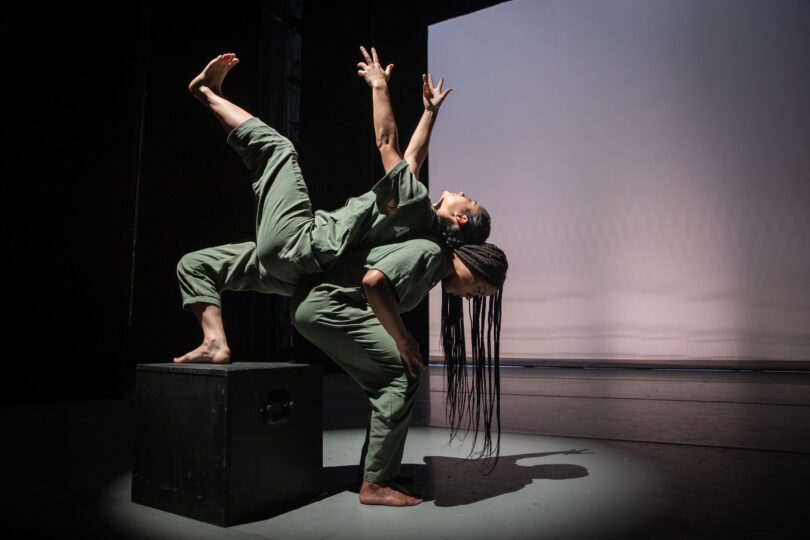PIVOT, Dance Repertory Theatre’s spring 2022 performance, combines choreographic works by both faculty and graduate students, meditating on the many interpretations of the word “pivot.” These choreographers infused their work with various dance forms, creating a well-rounded collection of performances that span ballet, contemporary, House, tap, hip-hop and body percussion, all performed by undergraduate dancers. To get a better idea of what audiences can expect, we spoke with each choreographer about the unique themes and dance styles that are incorporated into their work.
Charles O. Anderson (Of Mutants and Madmen): [Of Mutants and Madmen] is basically a kinesthetic exploration of this quote by Antonio Gramsci: “The old world is dying, the new world struggles to be born; now is the time of monsters.” Of Mutants and Madmen is part of a reimagining of the isle of Sycorax where Shakespeare’s The Tempest takes place.
Ryan K. Johnson (Sawubona): “Sawubona” is a Zulu greeting meaning “I see you.” As a Black artist scholar, living archive and ambassador of African Diasporic percussive dance methodologies and physical practice, I occupy space in identity and physical practice, actively Othered by society, the academy, philanthropy and the performing arts continuum. It’s time for a change! Inspired by President Barack Obama, “Change will not come if we wait for some other person or some other time. We are the ones we’ve been waiting for. We are the change that we seek,” my work centers social-political issues advancing the devolvement of bridges toward belonging and cultivating a more equitable landscape for generations of BIPOC practitioners. Through percussive dance, the Black dancing body becomes a vessel of political rebellion and a source of liberation, shedding and releasing generational traumas established by colonialism and the institution of whiteness.

Sawubona is an immersive performance exploration of music and movement rooted in ancestral memory, embodied storytelling and African Diasporic Percussive Dance addressing racial inequalities prevalent in the United States of America. The orchestration of digital projection, tap dance, stepping, House, West and South African inspired movement narrates an eleven-minute three section performance experience by eight artists. Sawubona takes audience members on a rhythmic and political journey addressing the Black lived experience.
Dorothy O’Shea Overbey (A Million Alien Gospels): Loosely inspired by a poem by Alice Meynell, this ballet presents a vision of spiritual pluralism and cosmic dialogue, exploring psychological openness and demonstrating how a breakthrough in our mindset might happen so simply, just by allowing ourselves to recognize the gifts and blessings always in our midst.
The poem inspired us to imagine the ballet’s main character, Alice, and all the beings with whom she dances, and thanks to whom she encounters the beautiful and difficult world around her for the first time. It is a message that grows with the dance, along all the lines of the music, at last containing a multitude of worlds, a universe of truths…a million alien gospels.

Love Muwwakkil (Let Them See): I heard about the school fight song before coming to The University of Texas at Austin, but didn’t look much into it. Then I experienced the Geography of Race Tour and gained more insight to the origins of the song, created and performed for the first time in 1903 in Blackface. When I experienced my first UT football game, my body had a visceral reaction as the fight song played and thousands of people chimed in to the words sung in the tune of I’ve Been Working on The Railroad.
I’ve learned over the years to listen to my body, for the body rarely lies. I decided to dig a little deeper and became interested in reframing this song in a different setting where people may have the opportunity to grapple with the words, and the feelings that it may invoke in some. I come from a background of artists that took risks in truth-telling, and I hope that I’ve accomplished some truth of my own in this piece through abstracted storytelling and bringing in voices that are rarely heard. Let Them See is an acknowledgement, a complication, a grappling and a love all at once.

Quilan “Cue” Arnold (Club KINGDOM (excerpt)): The spirit of Jaq (a colloquial term within the House dance community) has entered the earth through seven earthly vessels to show itself to humanity. These seven entities are unique parts of Jaq: Knowledge, Insight, Novelty, Grace, Deference, Others-Centric and Much. They have worked harmoniously together for 49 years creating, developing and sustaining “Club Kingdom,” a House-culture institution that conjures the full essence of Jaq– love and liberation– so that all may share in its glory.
During preparation for their 50th anniversary event they are hit with the news that a new virus has come upon the land, forcing a ban on in-person gatherings that threatens extinction upon their party and their business. As the seven face the unprecedented challenge of innovating their business during a bio-pandemic, new unforeseen tensions arise that threaten the existence of the spirit that brought them together. Dance/movement forms include ASL, House, animation, Waaking and hip-hop.
Witness these dance styles and themes collide in PIVOT, performed for one week only in the B. Iden Payne Theatre.

